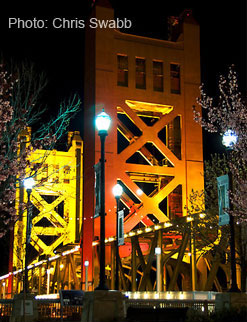

Tower Bridge was juried into the latest
Art Institute Show at Balboa Park in
San Diego, California.


History of Panoramic Photography
One of the eariliest patents for a panoramic camera was submitted by Joseph Puchberger from Austria in 1843. Later, in 1844, Friedrich von Martens from Germany developed a successful and technically superior panoramic camera. Click here
to read more...

Traveling with Your Photography Equipment
Traveling with your photo equipment does not have to be complicated. Here are a few tips.
1) If you fly, take your camera on board with you to greatly reduce the risk to your camera, hand screen any film and avoid contact with metal detectors, request that your film be hand screened. Try to keep your film separate from other materials by storing them in a separate container.
Avoid packing unprocessed film in your luggage. Luggage screeners may cause damage to your film.
Know, in advance, your airline's carry on and check out policies.
If your camera is digital, keep in mind, magnets can have your digital camera and avoid and high level magnetic fields.
2. Carry your camera with you at all times. Be conscious of security.
3. Plan ahead on how you will be storing digital images. Memory cards are best. Avoid carrying around too much equipment, i.e.... laptops.
4. Insure your equipment.
5. Take your manual with you.
6. Make sure you take all your cords, etc. with you. If anything needs an outlet, bring an electric plug adapter if you'll travel overseas. Bring one for your car, too, if you'll be doing a lot of shooting in the field.
7. Protect your camera from bad weather.
8. Avoid extreme heat.
9. Stay clear of any rain.
10. In cold weather utilize your body heat to keep your camera warm and avoid condensation. If condensation does occur, remove the battery and memory until they are dry.
11. Use a UV filter and protect your lens.
12. Take equipment you're familiar with. Traveling isn't the time to try out new equipment if you want to be confident you'll get good results.
13. Travel light with a good bag. Don't bring every lens or body you have “just in case.” By limiting yourself, you may also find new ways of seeing.
14. If you're going overseas, declare all your photo equipment with custom officials at the airport before you leave so you won't have to prove ownership when you return.

